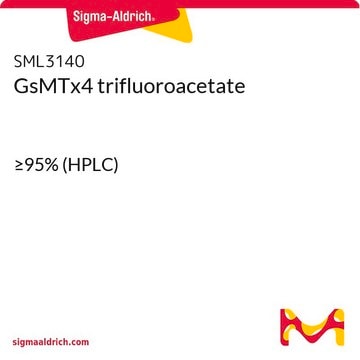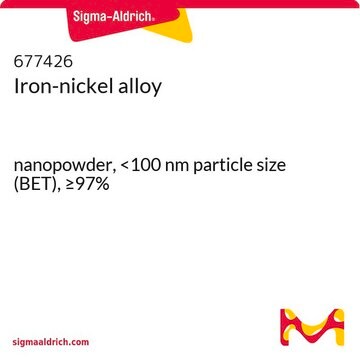746835
Iron
nanopowder, 25 nm avg. part. size, 99.5% trace metals basis
About This Item
Produits recommandés
Pureté
99.5% trace metals basis
Forme
nanopowder
Résistivité
9.71 μΩ-cm
Taille moy. des particules
25 nm
Point d'ébullition
2750 °C (lit.)
Pf
1535 °C (lit.)
Densité
7.86 g/mL at 25 °C (lit.)
Application(s)
battery manufacturing
Chaîne SMILES
[Fe]
InChI
1S/Fe
Clé InChI
XEEYBQQBJWHFJM-UHFFFAOYSA-N
Application
Mention d'avertissement
Warning
Mentions de danger
Conseils de prudence
Classification des risques
Flam. Sol. 2 - Self-heat. 2
Code de la classe de stockage
4.2 - Pyrophoric and self-heating hazardous materials
Classe de danger pour l'eau (WGK)
nwg
Point d'éclair (°F)
69.8 °F
Point d'éclair (°C)
21 °C
Certificats d'analyse (COA)
Recherchez un Certificats d'analyse (COA) en saisissant le numéro de lot du produit. Les numéros de lot figurent sur l'étiquette du produit après les mots "Lot" ou "Batch".
Déjà en possession de ce produit ?
Retrouvez la documentation relative aux produits que vous avez récemment achetés dans la Bibliothèque de documents.
Les clients ont également consulté
Articles
Professor Hui Mao explores the use of superparamagnetic iron oxide nanoparticles (INOPs) that offer an alternate contrast-enhancing mechanism.
TiO2 exhibits wide band gap semiconductor and memristor properties electronically, with high opacity and UV absorbance optically.
Prof. Yadong Yin discusses various synthesis methods of magnetite nanocrystals and their applications in different fields.
Magnetic materials find diverse applications from data storage to renewable energy.
Notre équipe de scientifiques dispose d'une expérience dans tous les secteurs de la recherche, notamment en sciences de la vie, science des matériaux, synthèse chimique, chromatographie, analyse et dans de nombreux autres domaines..
Contacter notre Service technique![Difluoro(4-(1,1-dimethylethyl)-2-{1-[4-(1,1-dimethylethyl)-3,5-dimethyl-2H-pyrrol-2-ylidene-N]ethyl}-3,5-dimethyl-1H-pyrrol-2-ylidene-N]ethyl}-3,5-dimethyl-1H-pyrrolato-N)boron 98% (HPLC)](/deepweb/assets/sigmaaldrich/product/structures/207/879/8046aafd-78ca-4fd8-92dc-801de0b6cc53/640/8046aafd-78ca-4fd8-92dc-801de0b6cc53.png)




![(R)-[(RuCl(SEGPHOS®)2(μ-Cl)3[NH2Me2]](/deepweb/assets/sigmaaldrich/product/structures/690/323/6e59fefa-87f1-40b6-b304-70101b15972b/640/6e59fefa-87f1-40b6-b304-70101b15972b.png)






